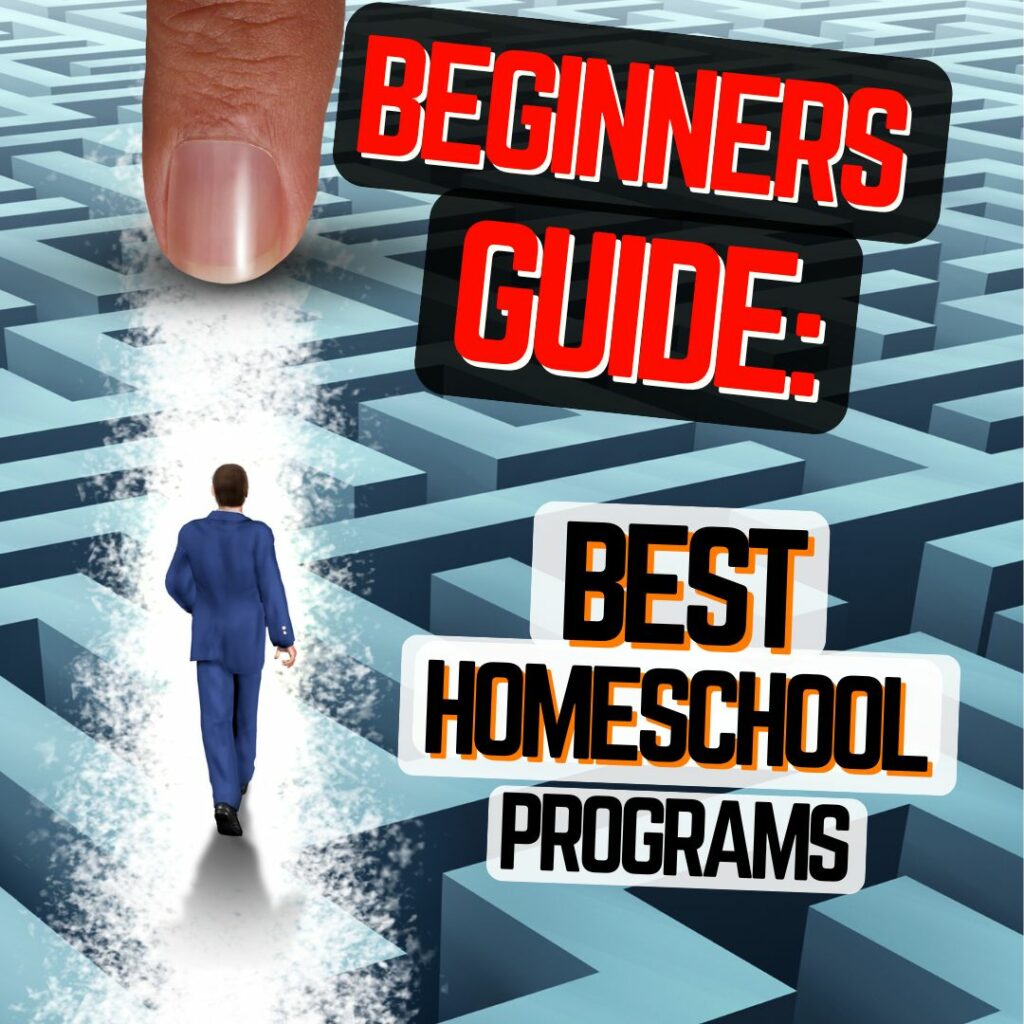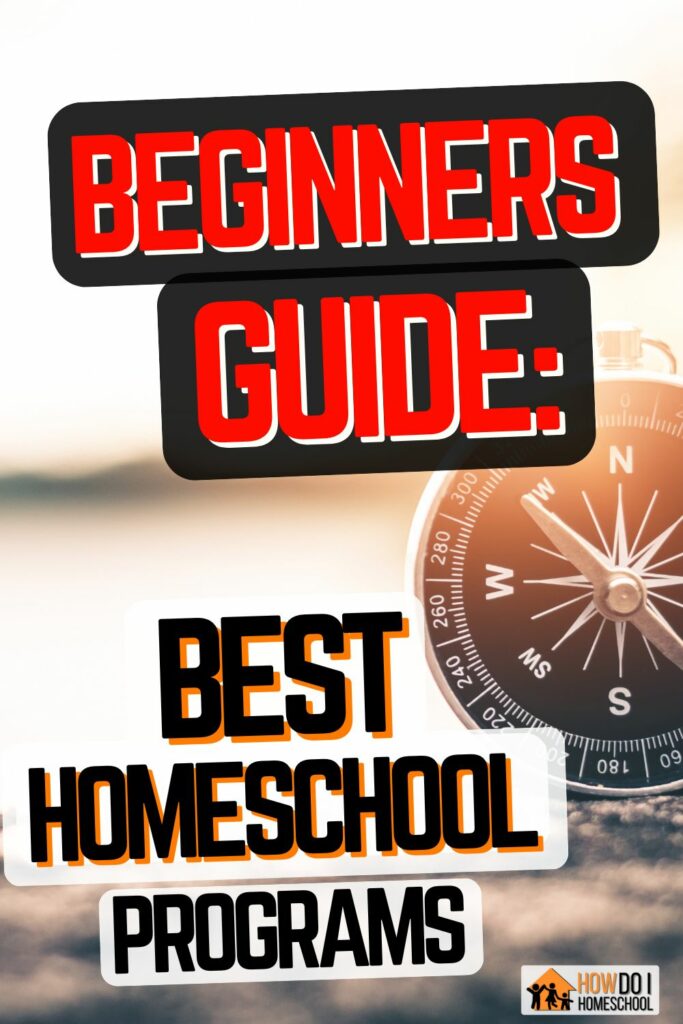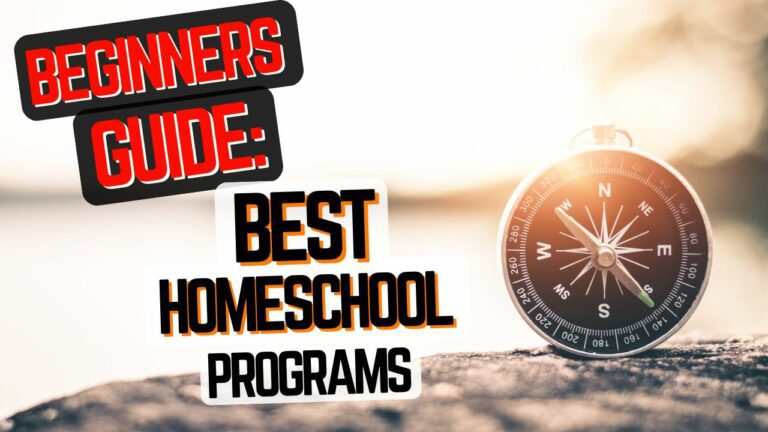Welcome to the world of homeschooling, where homeschool program choices can feel overwhelming. As a homeschool parent, it’s common to feel lost among the many programs available. But don’t worry! In this guide, I’m here to help. I’ll give you knowledge and insights to help you navigate the options. My goal is to show you how to choose a homeschool curriculum that’s perfect for your family – one that really sparks your child’s love for learning.

I hope you enjoy reading this blog post. If you want to do my course on how to homeschool, click here.
In this article we’re going to take a look at the following types of curriculum choices:
- free, cheap, and more expensive curriculum
- homeschool method driven
- accredited vs non-accredited
- self-paced and hands-on homeschool curriculum
- family style
- curriculum by subjects
- easy and more rigorous programs
- all-in-one homeschool choices
- offline and online homeschool programs
- best programs by age
- preschool options and more…
I’ve also scattered interesting curriculum roundup videos through the article from my youtube channel that I know you’ll love.
By the end, you’re going to have a thorough understanding of what’s out there. Let’s get started!

Affiliate Links Used in this Post.
Free, Cheap, and High-End Programs
When considering the cost of homeschooling, curriculum costs usually make up a large part of your homeschool budget.
And that’s probably a good thing considering you’ll be using your program for hours each day.
You want it to be good.
Free Homeschool Programs
But homeschooling curriculum is unlike many areas of life.
You really can get a free meal!
That is, the free homeschool programs available are of high quality, and parents can rely on some of them to give their children a good education.
However, books won’t have the same quality as other programs, and you’ll usually have to read lessons online or print black-and-white PDFs.
Some great choices for free programs include:
- Easy Peasy All-in-One – reviewed here
- Ambleside Online – reviewed here
- Khan Academy (only a supplement, though) – reviewed here
- see more options here.
But, if you have a small budget, there are other options.
Cheap or Affordable Homeschool Programs
Spending a little bit on a homeschool curriculum means you get access many more electives, support and training resources.
Some great affordable programs are:
- Schoolhouse Teachers – curriculum for all grades, subjects (+ electives) for one price – review here
- Compass Classroom – all subjects for all grades – review here
- Robinson Curriculum – one giant PDF kids can do on thier own – review here
- see more options here.
These options are great, but sometimes you want a program that really excites you with quality printing, video lessons, or other special features.
More Expensive Programs
And that’s where your higher-end curriculum comes in.
These programs come with well-printed textbooks, video lessons so parents don’t have to teach themselves, or other perks.
Some great options are:
- BJU Press – reviewed here
- Veritas Press – Free consultation here – reviewed here
- Abeka – reviewed here
- see more options here.
Homeschool Programs by Method
Homeschooling means you can choose a way of homeschooling that works for your family.
This is called a homeschool method (do a quiz here if you don’t know what method will suit you or read this article).
Charlotte Mason Method
Charlotte Mason programs emphasize living books, nature study, and hands-on experiences. Options include:
- A Gentle Feast – Charlotte Mason homeschool curriculum with daily lesson plans
- Ambleside Online – a free curriculum with schedules and booklists
- Heart of Dakota – a mailable program
- or see more here.
These is one of the most popular home education methods.
Classical Method
Another very populular homeschool method is the classical method.
They emphasiz the study of classical literature, history, and critical thinking skills. Options include:
- Veritas Press – online LIVE or self-paced classes – book a free consultation with them here.
- Memoria Press – mailable program
- Compass Classroom – affordable video-based classical program
- or see more here.
Eclectic Method
Combines various educational approaches to create a personalized curriculum. Options include:
- Schoolhouse Teachers – reviewed here
- My Father’s World – reviewed here
- Tapestry of Grace – reviewed here
- or see more here.
But maybe you’re after a curriculum with a familiar sort of feel. This is how traditional programs feel.
Traditional Method
These follow a structured curriculum with textbooks and assignments with or without video lessons. Options include:
These all have video lesson options that allow kids to teach themselves for the most part with video lessons. BJU Press and Abeka offer physical workbooks also.
Literature-Based Method
Learning through engaging books, integrating reading and discussion across subjects. Options include:
- Sonlight – reviewed here
- Beautiful Feet Books
- Great Books Homeschool
Sometimes there is an overlap between some methods such as the literature-based approach and the Unit Studies approach.
Unit Studies
Unit Studies programs focus on exploring topics in-depth through cross-curricular activities. Options include:
- Notgrass – From Adam to Us
- Gather ‘Round Homeschool
- Five in a Row
- see more options here
Unschooling
These allow children to learn naturally based on their interests and curiosity.
You can use no curriculum, but many unschoolers find having a broad curriculum is helpful if children want to explore certain subjects.
Good options include:
- Schoolhouse Teachers – massive amount options and courses for one price
- Youtube – learn anything for free
- Khan Academy – secular video-based homeschool supplement.
Unschooling is a great option for some parents, but it can be scary if you’re concerned about holes.
Accredited vs Non-Accredited
Many people want an accredited homeschool program. Traditional education says this is a way to make sure you cover all the subjects a child will need for life.
While the majority of homeschools don’t need accreditation (accreditation is a fancy word for studying in an online school – so it’s not really a homeschool), some parents like it.
These programs come in accredited and unaccredited versions:
- Veritas Press – free consultation here
- Northgate Academy – for high school
- BJU Press
- see more here.
But studying with an accredited program is not always so flexible because you have items you must tick off.
Self-Paced curriculum
Self-paced curricula offer more flexibility.
Homeschoolers can work faster than normal (for example if a child is gifted or quite academic) or slower than normal (children with medical conditions or special needs).
Check out this list of homeschool curriculum programs that are self-paced:
- Apologia
- Notgrass
- Compass Classroom
- Schoolhouse Teachers
- ACE Paces
- All About Learning Press
- Veritas Press – free consultation here
- more options here.
There are so many more self-paced options. That’s because they’re so popular and helpful for homeschoolers.
Hands-On Options
Hands-on homeschooling options are also popular among home educators.
This approach helps children learn with their hands, involving more than one learning style. Curriculum known for hands-on learning are:
Hands-on curriculum programs are fantastic but difficult if you have a large family.
Family-Style Homeschool Programs
If you have a larger family, good options are ones you can do with your whole family.
Or , if children can homeschool themselves, they are curricula with broad subject options.
These include:
- A Gentle Feast
- Apologia,
- Notgrass,
- Five-in-a-Row,
- see more here.
If your children are older, Schoolhouse Teachers offers lots of choices for all grades.
Curriculum by Subjects
Many parents look for curriculum providers that offer the best program for a particular subject.
Here are some favorites of mine for certain subjects:
- Math – Math-U-See (more Math options here)
- Reading/Writing/Spelling – All About Reading & All About (more here)
- Science –Apologia (more Science here)
- History – Notgrass (more History options here)
- Geography – Around the World in 180 Days (more Geography here)
- Latin – Compass Classroom (more Latin options here)
- History and Geography combined – Heritage Studies by BJU Press
- Electives – Schoolhouse Teachers
But, it can be a lot of work and research choosing every subject from different providers. So, choosing a whole year’s worth of All subjects might be better suited.
All-In-One Homeschool Programs
That’s where all-in-one (or full) homeschool curriculum programs come in. They offer you all the subjects you’ll need, making shopping easier.
Some of the best all-in-one homeschool programs are:
- Schoolhouse Teachers
- BJU Press
- Veritas Press – Free consultation here
- Abeka – reviewed here
- Lifepac
- Easy Peasy All-in-One (free) – you can turn this into a free offline curriculum by printing the lessons.
Keep in mind that most companies offer several subjects, but not all programs offer all subjects.
Easy and Rigorous Programs
Some homeschool programs are harder than others. Easier options might suit students with medical or special needs, while harder programs might suit gifted students.
More Rigrous Programs
These curricula are known for being a little more rigorous than the average pace set in most schools:
- Heart of Dakota (Charlotte Mason)
- Classical Academic Press (Classical – classical programs tend to be more rigerous)
- Math Programs: Singapore Math, Russian Math, Beast Academy
- Reading – Rod and Staff, IEW
BJU Press and Apologia are perhaps slightly more rigorous than normal too.
Easier Programs
Some programs are slightly easier, making them perfect choices if young children are listening in. These include:
- Masterbooks (Charlotte Mason – Charlotte Mason programs tend to be easier)
- Five in a Row
- ACE Paces – one of the easiest homeschool programs as students do this one independently
These curricula are known for being a little easier than the average pace set in most schools:
Offline and Online Homeschool Programs
Then you can classify curricula into computer-based or unplugged homeschool curriculum programs.
Offline/Boxed/Mailable
Choosing a hardcopy curriculum means your children spend less time on screens. Given this often causes addiction, many parents prefer an offline homeschool program. Some options include:
- BJU Press and Abeka – teach-it-yourself option with teachers manuals
- Apologiaand Notgrass,
- Masterbooks and Five in a Row
- Lifepac and Horizons
- and more options here.
But, these paper-based homeschool programs leave a trail (or should I say trial) of papers all of the place which can frustrate parents.
Online Homeschool Programs
So then there are online curricula where parents can have automatic grading and record keeping. These programs include:
- Monarch (by AOP)
- Compass Classroom
- Veritas Press – free consultation
- IXL – secular
- BJU Press and Abeka -(video lessons are online with physical workbooks)
Best Homeschool Programs By Age
Some curriculum programs do an outstanding job of catering to specific ages. These are just some of the ones I can think of:
- Compass Classroom – middle and high school
- Five in a Row – elementary years
- College Prep Science – high school
- From Adam to Us – middle school
This doesn’t include the all in one curriculum programs that cater to all ages (see above).
Preschool Options
Then there is preschool homeschool curriculum.
I honestly think the best program to use here is just play. But, there is a curriculum for even that!
But there comes a time when most homeschool parents want to start getting into formal learning a bit more with our children.
Kindergarten Homeschool Curriculum
And that’s when kindergarten comes in. You can use so many programs for kindergarten.
Here are some of my favorites:
- Focus on Fives (BJU Press)
- Five in a Row
- My Father’s World
- and here are some more.

Q&A : Common Questions About Homeschool Programs ANSWERED
You may still have some questions about what to buy and when.
Here are some common homeschool FAQs to consider.
Q: What is a homeschool program?
A: A homeschool program refers to an educational approach where parents or guardians take responsibility for their child’s education at home, following a structured curriculum or educational method.
Q: How do I choose the right homeschool program?
A: When choosing a homeschool program, consider your child’s learning style, educational goals, and available resources.
Research different methods, curriculum options, and online resources to find the best fit for your family.
Q: Can I homeschool if I’m not a trained teacher?
A: Absolutely!
Homeschooling does not require formal teaching credentials.
Parents can successfully homeschool their children with dedication, resources, and support from homeschooling communities or online platforms.
Q: Are homeschool programs expensive?
A: The cost of homeschool programs can vary depending on the chosen curriculum, resources, and materials.
There are both free and paid options available (see above), allowing families to find options that fit their budget.
Q: Can homeschooled students get into college?
A: Yes, homeschooled students can attend college.
Many colleges and universities have admission processes specifically designed for homeschoolers, which may include submission of portfolios, standardized test scores, and interviews.
Q: How do homeschoolers meet academic requirements and standards?
A: Homeschoolers typically follow their state or country’s educational requirements and standards.
This can be achieved by selecting accredited curriculum providers, tracking progress through portfolios or assessments, or by participating in standardized testing.
Q: Can I homeschool multiple children with different grade levels?
A: Yes, homeschooling allows for flexibility in teaching multiple children with different grade levels.
Parents can adapt curriculum materials and schedules to meet each child’s individual needs while fostering a collaborative learning environment.
Q: Can homeschooled students participate in extracurricular activities and sports?
A: Yes, homeschooled students can often participate in extracurricular activities and sports offered by local schools, community organizations, or homeschool associations.
Rules and eligibility may vary by location.
Q: How do homeschool programs handle subjects like science and laboratory experiments?
A: Homeschool programs often provide resources, kits, and online simulations to facilitate hands-on science experiments and laboratory work at home.
Local science centers and museums may also offer workshops or lab access for homeschoolers.
Q: What if I don’t have enough time to teach all the subjects?
A: Homeschooling allows flexibility in scheduling.
Parents can adjust the curriculum, prioritize core subjects, utilize online courses or tutors, and incorporate independent learning to fit their available time and resources.
Q: Do homeschool programs provide transcripts and diplomas?
A: Homeschool programs typically offer methods for tracking progress and generating transcripts or report cards.
Additionally, homeschooled students can earn a high school diploma equivalent to those obtained in traditional schools.
Q: Can homeschooling be a temporary solution, or is it a long-term commitment?
A: Homeschooling can be adapted to various circumstances.
It can be a short-term solution to address specific needs or challenges or a long-term commitment providing a complete education until graduation.
Q: Are there any online homeschool programs available?
A: Yes, numerous online homeschool programs offer curriculum, lesson plans, educational materials, and virtual support.
These programs cater to various grade levels and educational approaches.
Q: How can I assess my child’s progress in a homeschool program?
A: Homeschool programs offer assessment methods like quizzes, tests, projects, and portfolios.
Parents can also track progress through regular evaluations, discussions, and observations of their child’s understanding and development.
Q: Can homeschooling be tailored to accommodate special needs or learning differences?
A: Yes, homeschooling can be customized to meet the unique needs of children with special needs or learning differences.
There are specialized homeschool curricula and resources available, along with support from professionals and online communities.
Q: Can I homeschool my child if I work full-time?
A: Yes, it is possible to homeschool while working full-time, although it requires careful planning, flexibility, and potentially seeking assistance from tutors, online programs, or support from family members or homeschool co-ops.
Choosing the right homeschool program that allows kids to self-educate will help a lot with this. BJU Press and Veritas Press offer this. If you want to talk more about those options, you can get a free consultation with Veritas Press here.
Subscribe to How to Homeschool (Youtube channel)
If you’re eager to know more about homeschooling and you’re new to this whole home education thing, hop on over to my YouTube channel, where a treasure trove of homeschooling wisdom awaits.
From practical tips to curriculum reviews and more, you’re going to love it!
Enroll in the Homeschool Parenting Program
For those yearning for a comprehensive guide to homeschooling, look no further than my Homeschool Parenting Program.
This online course will equip you with the knowledge, strategies, and confidence to navigate the exhilarating world of homeschooling like a seasoned pro.
Enroll today and unlock the door to extraordinary educational possibilities.
God bless y’all.



